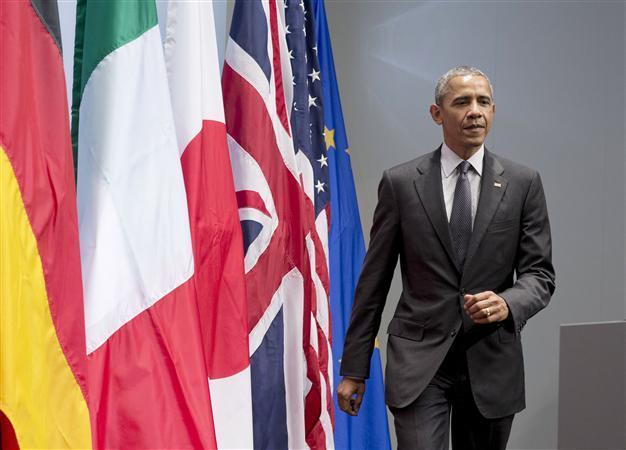Obama tells Greeks it's time to make tough decisions
Elmau Castle, Germany - Agence France-Presse

AP Photo
US President Barack Obama weighed in June 8 on the Greece crisis, telling Greeks they need to make tough choices to save their country from a default and possible messy euro exit.Obama said after a meeting with fellow G7 leaders that there is a "sense of urgency in finding a path to resolve the situation."
But a resolution requires Athens to be "serious about making some important reforms not only to satisfy creditors but more importantly to create a platform whereby the Greek economy can start growing again and prosper."
"So the Greeks are going to have to follow through and make some tough political choices that will be good for the long term," added Obama.
While pushing the Greeks to hold up their end of the deal, Obama also called for flexibility from its creditors.
"If both sides are showing a sufficient flexibility, then I think we can get this problem resolved, but it will require some tough decisions for all involved," he said.
Germany, the host of the G7 summit, also urged Greece to speed up talks on a loan deal with its international creditors.
"There's not much time left. We have to work very hard on this," German Chancellor Angela Merkel said at the close of the summit.
France's President Francois Hollande also stressed that the end of June "is the maximum deadline" for a deal.
"But nothing stops us from moving quicker, and I think that it's in Greece's interest that it speeds up, to remove uncertainties," he said.
Speaking at an event in Berlin, Greek Finance Minister Yanis Varoufakis echoed calls for a swift accord and warned it would go down as a historic "failure" if EU leaders didn't agree on a deal.
Greece needs to unlock some 7.2 billion euros ($8 billion) in rescue funds in order to be able to repay 1.6 billion euros to the International Monetary Fund by June 30.
A default could trigger a series of events that could result in a messy exit from the euro.
But after five months, the talks are still stuck on disagreement between Greece and its creditors on its future budget goals, economic reforms and tax revenues.
The radical-left government in Athens said it would continue efforts to reach agreement despite testy exchanges with European officials in recent days.
And Prime Minister Alexis Tsipras has sought a meeting on June 10 with Merkel and Hollande on the sidelines of an EU-Latin America summit in Brussels.
"Talks are continuing in Brussels at a political level to examine the prospects of a common agreement," Greek government spokesman Gabriel Sakellaridis told reporters.
He added that Minister of State Nikos Pappas, one of Tsipras's closest advisors, had joined the technical mission for Monday's talks.
The Wall Street Journal reported that the European Commission and European Central Bank, two of the troika of Greece's official creditors, were weighing extending their bailout program until March 2016, when the parallel rescue program of the third, the International Monetary Fund, also finishes.
The Journal said that a nine-month extension would help Athens bridge a deep funding gap that has put it on the edge of default on its loans.
"But it doesn't resolve a clash between the two sides over what conditions would be attached to the continued support," the Journal said.
But as negotiations have dragged, tempers have flared on both sides.
EU Commission chief Jean-Claude Juncker criticized Tsipras over the weekend, accusing him of misrepresenting reform proposals that the bloc had put to Athens last week.
Juncker also said Athens had failed to deliver a counter-proposal.
The EU's five-page list of reforms includes sales tax hikes and cuts to civil servants' salaries and pensions.
But Tsipras rejected them as "absurd" and wants his government's 47-page blueprint to serve as the basis for the talks.
Varoufakis, however, sought to calm nerves and move things beyond recriminations.
"It is time to stop pointing fingers at one another and it is time that we do our job to bring to fruition months of efforts to come to an agreement," he said in Berlin after meeting German Finance Minister Wolfgang Schaeuble.
Tsipras, 40, is under pressure from hardliners in his radical left Syriza party to reject any deal that piles further austerity on the recession-hit country.
Several Syriza members have called for early elections if the government is forced to accept austerity measures outside its mandate.
















